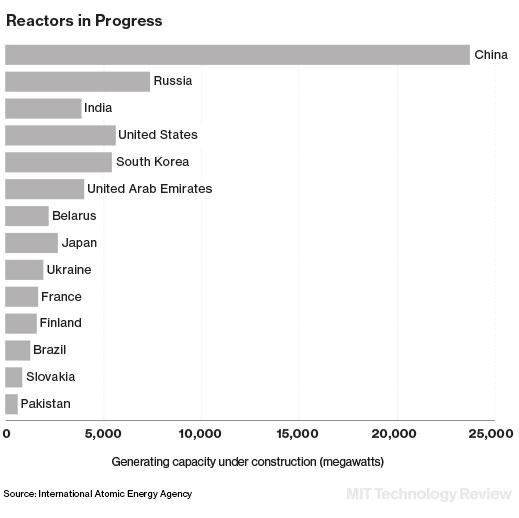China Will Soon Leapfrog Traditional Leaders in Nuclear Power
China is rapidly moving up the global nuclear power leaderboard. Since 2012, as the traditional leaders in nuclear energy production have remained stagnant or backed off of their reliance on nuclear in the wake of Fukushima, China has added 11 new reactors and over 11 gigawatts of nuclear generating capacity.
By the end of this year, China is expected to pass Russia and South Korea and boast the fourth-largest nuclear generating capacity in the world, behind the United States, France, and Japan. By 2020 it will likely replace Japan in third place.
This trend shows no signs of slowing, because China has huge ambitions for adding new reactors, including advanced reactor designs, in the coming decades (see “Nuclear Options”). The country plans to increase its capacity from 23 gigawatts currently to 58 gigawatts by 2020, at which point it is also aiming to have 30 additional gigawatts under construction, according to the World Nuclear Association. Right now, of the 64 reactors being built around the world, 24 are in China—15 more than in second-place Russia.

The Chinese government is banking on nuclear playing a significant role in helping it achieve its goals of having 15 percent of overall energy consumption come from non-fossil fuel sources by 2020, and 20 percent by 2030 (in 2012, 91 percent came from fossil fuels, according to the Energy Information Administration).
Nuclear will also be very important, in addition to wind, solar, and hydropower, if China is to deliver on its promise that its annual emissions will level off no later than 2030 (See: “China Could Deliver on Its Carbon Promise Earlier than Expected”).
Keep Reading
Most Popular
Large language models can do jaw-dropping things. But nobody knows exactly why.
And that's a problem. Figuring it out is one of the biggest scientific puzzles of our time and a crucial step towards controlling more powerful future models.
How scientists traced a mysterious covid case back to six toilets
When wastewater surveillance turns into a hunt for a single infected individual, the ethics get tricky.
The problem with plug-in hybrids? Their drivers.
Plug-in hybrids are often sold as a transition to EVs, but new data from Europe shows we’re still underestimating the emissions they produce.
Google DeepMind’s new generative model makes Super Mario–like games from scratch
Genie learns how to control games by watching hours and hours of video. It could help train next-gen robots too.
Stay connected
Get the latest updates from
MIT Technology Review
Discover special offers, top stories, upcoming events, and more.